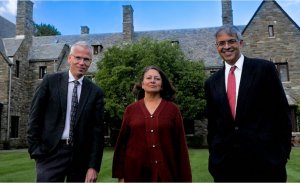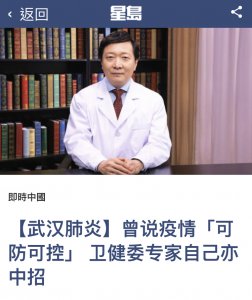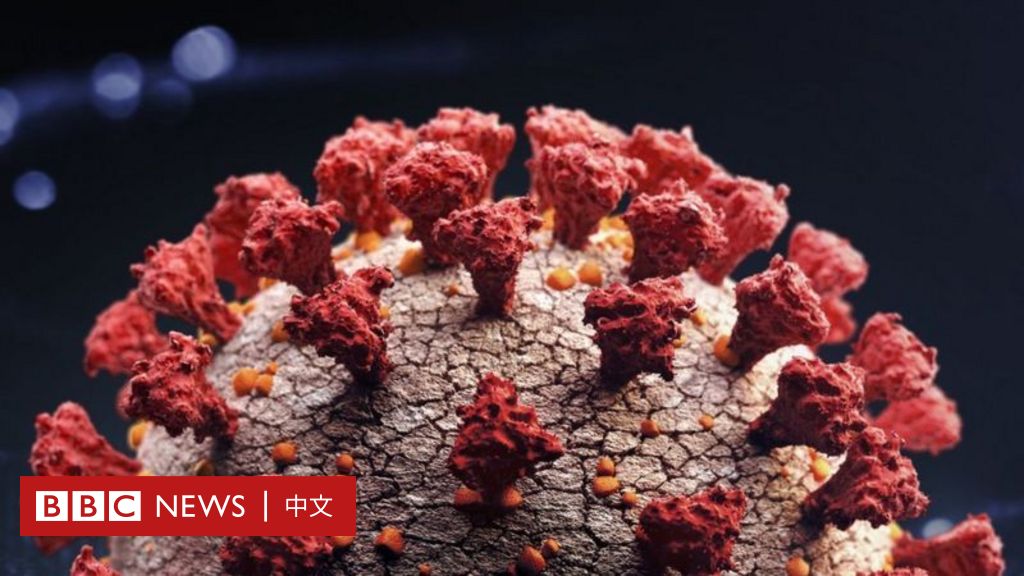这是一个观点。我不做评价。当然我转贴了,多多少少算是一个立场。
看看他们说的有没有道理吧。
==================================================

三位起草“大巴灵顿宣言”的科学家
背景介绍:三位顶尖科学家撰稿“大巴灵顿宣言”,唿吁人们回归正常生活。截止美东时间10月10日7点50分,已经有7,137位医学科学家,15,797位医务人员,223,879位关注此议题的公众人员,签署了该宣言。撰稿宣言的科学家为:
Dr. MartinKulldorff, 哈佛大学医学教授,生物统计学家,流行病学家;在检测和监测传染病暴发和疫苗安全性评估方面具有专业知识。
Dr. Sunetra Gupta, 牛津大学教授,流行病学家,在免疫学、疫苗开发和传染病的数学建模方面具有专业知识。
Dr. Jay Bhattacharya, 斯坦福大学医学院教授,医学博士,流行病学家,卫生经济学家和公共卫生政策专家,专注于传染病和易感染人群。
英文原文链接:https://gbdeclaration.org/
==============================================
大巴灵顿宣言
作为传染病流行病学家和公共卫生科学家,我们对现行的疫情政策对身心健康的破坏性影响,表示深切关注,并建议采取一种我们称之为重点保护的办法。
我们来自世界各地的左右派阵营,我们奉献自己的职业生涯于保护人民。目前的封锁政策,对公众健康,正产生短期和长期破坏性的影响。其结果(仅举几例)包括:儿童疫苗接种率降低、心血管疾病的管理恶化、癌症筛查降低和精神健康恶化。这些会导致未来几年死亡率超增,而工薪阶层和年轻人的负荷最重。让学生不能返校上学,也是一种严重的不公平。
在疫苗问世之前,继续采取封锁措施,将造成不可挽回的损失,而弱势群体,首当其冲。
可喜的是,我们对新冠病毒的认识在不断加深。我们知道,年老体弱者感染新冠病毒死亡的几率,比年轻人高一千多倍。事实上,对于儿童来说,新冠病毒的危险性,要低于包括流感在内的许多其它危害。
随着人群中免疫力的增强,包括年老体弱者在内的所有人被感染的风险,都会下降。我们知道,人群最终会达到群体免疫,即新的感染率持稳。这可以借助疫苗来实现,但不依赖于疫苗。因此,我们的目标,应该是最大限度地降低死亡率和社会危害,直到达到群体免疫。
在达到群体免疫前,最具同情心、最权衡利弊的办法,是让那些死亡风险最小的人正常生活。让他们通过自然感染,建立对病毒的免疫力。同时,更好地保护那些风险最高的人。我们称之为重点保护方案。
采取措施保护年老体弱者,应该是公共卫生部门应对新冠疫情的核心目标。例如,养老院应该使用已获免疫力的工作人员,并经常对其他工作人员和所有来访者进行PCR检测。应尽量减少工作人员的轮换。居住在家的退休人员,应让人将食品和其它必需品送至家中。若情况许可,他们与亲人见面,应该在室外,而非室内。公共卫生部门的专业人员,提供全面而详细的措施清单(包括家庭多代同住的方法),是可以实施的,也完全是在他们的责任范围和能力之内。
不易受新冠病毒伤害的人,应立即让他们恢复正常生活。当然,每个人都应实行简单的卫生措施,如洗手和生病时呆在家里,以降低群体免疫阈值(the herd immunity threshold)。学校和大学,应该开放面授,恢复体育等课外活动。低风险的年轻人,应该正常工作,而不是在家工作。餐馆和其它企业,应该开门营业。艺术、音乐、体育和其它文化活动,应当恢复。疫情风险较大的人,如果他们自己愿意,也可以参加这些活动。整个社会,则可以享受已经建立起群体免疫的人赋予年老体弱者的保护。
The Great Barrington Declaration
The Great Barrington Declaration – As infectious disease epidemiologists and public health scientists we have grave concerns about the damaging physical and mental health impacts of the prevailing COVID-19 policies, and recommend an approach we call Focused Protection.
Coming from both the left and right, and around the world, we have devoted our careers to protecting people. Current lockdown policies are producing devastating effects on short and long-term public health. The results (to name a few) include lower childhood vaccination rates, worsening cardiovascular disease outcomes, fewer cancer screenings and deteriorating mental health – leading to greater excess mortality in years to come, with the working class and younger members of society carrying the heaviest burden. Keeping students out of school is a grave injustice.
Keeping these measures in place until a vaccine is available will cause irreparable damage, with the underprivileged disproportionately harmed.
Fortunately, our understanding of the virus is growing. We know that vulnerability to death from COVID-19 is more than a thousand-fold higher in the old and infirm than the young. Indeed, for children, COVID-19 is less dangerous than many other harms, including influenza.
As immunity builds in the population, the risk of infection to all – including the vulnerable – falls. We know that all populations will eventually reach herd immunity – i.e. the point at which the rate of new infections is stable – and that this can be assisted by (but is not dependent upon) a vaccine. Our goal should therefore be to minimize mortality and social harm until we reach herd immunity.
The most compassionate approach that balances the risks and benefits of reaching herd immunity, is to allow those who are at minimal risk of death to live their lives normally to build up immunity to the virus through natural infection, while better protecting those who are at highest risk. We call this Focused Protection.
Adopting measures to protect the vulnerable should be the central aim of public health responses to COVID-19. By way of example, nursing homes should use staff with acquired immunity and perform frequent PCR testing of other staff and all visitors. Staff rotation should be minimized. Retired people living at home should have groceries and other essentials delivered to their home. When possible, they should meet family members outside rather than inside. A comprehensive and detailed list of measures, including approaches to multi-generational households, can be implemented, and is well within the scope and capability of public health professionals.
Those who are not vulnerable should immediately be allowed to resume life as normal. Simple hygiene measures, such as hand washing and staying home when sick should be practiced by everyone to reduce the herd immunity threshold. Schools and universities should be open for in-person teaching. Extracurricular activities, such as sports, should be resumed. Young low-risk adults should work normally, rather than from home. Restaurants and other businesses should open. Arts, music, sport and other cultural activities should resume. People who are more at risk may participate if they wish, while society as a whole enjoys the protection conferred upon the vulnerable by those who have built up herd immunity.
看看他们说的有没有道理吧。
==================================================

三位起草“大巴灵顿宣言”的科学家
背景介绍:三位顶尖科学家撰稿“大巴灵顿宣言”,唿吁人们回归正常生活。截止美东时间10月10日7点50分,已经有7,137位医学科学家,15,797位医务人员,223,879位关注此议题的公众人员,签署了该宣言。撰稿宣言的科学家为:
Dr. MartinKulldorff, 哈佛大学医学教授,生物统计学家,流行病学家;在检测和监测传染病暴发和疫苗安全性评估方面具有专业知识。
Dr. Sunetra Gupta, 牛津大学教授,流行病学家,在免疫学、疫苗开发和传染病的数学建模方面具有专业知识。
Dr. Jay Bhattacharya, 斯坦福大学医学院教授,医学博士,流行病学家,卫生经济学家和公共卫生政策专家,专注于传染病和易感染人群。
英文原文链接:https://gbdeclaration.org/
==============================================
大巴灵顿宣言
作为传染病流行病学家和公共卫生科学家,我们对现行的疫情政策对身心健康的破坏性影响,表示深切关注,并建议采取一种我们称之为重点保护的办法。
我们来自世界各地的左右派阵营,我们奉献自己的职业生涯于保护人民。目前的封锁政策,对公众健康,正产生短期和长期破坏性的影响。其结果(仅举几例)包括:儿童疫苗接种率降低、心血管疾病的管理恶化、癌症筛查降低和精神健康恶化。这些会导致未来几年死亡率超增,而工薪阶层和年轻人的负荷最重。让学生不能返校上学,也是一种严重的不公平。
在疫苗问世之前,继续采取封锁措施,将造成不可挽回的损失,而弱势群体,首当其冲。
可喜的是,我们对新冠病毒的认识在不断加深。我们知道,年老体弱者感染新冠病毒死亡的几率,比年轻人高一千多倍。事实上,对于儿童来说,新冠病毒的危险性,要低于包括流感在内的许多其它危害。
随着人群中免疫力的增强,包括年老体弱者在内的所有人被感染的风险,都会下降。我们知道,人群最终会达到群体免疫,即新的感染率持稳。这可以借助疫苗来实现,但不依赖于疫苗。因此,我们的目标,应该是最大限度地降低死亡率和社会危害,直到达到群体免疫。
在达到群体免疫前,最具同情心、最权衡利弊的办法,是让那些死亡风险最小的人正常生活。让他们通过自然感染,建立对病毒的免疫力。同时,更好地保护那些风险最高的人。我们称之为重点保护方案。
采取措施保护年老体弱者,应该是公共卫生部门应对新冠疫情的核心目标。例如,养老院应该使用已获免疫力的工作人员,并经常对其他工作人员和所有来访者进行PCR检测。应尽量减少工作人员的轮换。居住在家的退休人员,应让人将食品和其它必需品送至家中。若情况许可,他们与亲人见面,应该在室外,而非室内。公共卫生部门的专业人员,提供全面而详细的措施清单(包括家庭多代同住的方法),是可以实施的,也完全是在他们的责任范围和能力之内。
不易受新冠病毒伤害的人,应立即让他们恢复正常生活。当然,每个人都应实行简单的卫生措施,如洗手和生病时呆在家里,以降低群体免疫阈值(the herd immunity threshold)。学校和大学,应该开放面授,恢复体育等课外活动。低风险的年轻人,应该正常工作,而不是在家工作。餐馆和其它企业,应该开门营业。艺术、音乐、体育和其它文化活动,应当恢复。疫情风险较大的人,如果他们自己愿意,也可以参加这些活动。整个社会,则可以享受已经建立起群体免疫的人赋予年老体弱者的保护。
The Great Barrington Declaration
The Great Barrington Declaration – As infectious disease epidemiologists and public health scientists we have grave concerns about the damaging physical and mental health impacts of the prevailing COVID-19 policies, and recommend an approach we call Focused Protection.
Coming from both the left and right, and around the world, we have devoted our careers to protecting people. Current lockdown policies are producing devastating effects on short and long-term public health. The results (to name a few) include lower childhood vaccination rates, worsening cardiovascular disease outcomes, fewer cancer screenings and deteriorating mental health – leading to greater excess mortality in years to come, with the working class and younger members of society carrying the heaviest burden. Keeping students out of school is a grave injustice.
Keeping these measures in place until a vaccine is available will cause irreparable damage, with the underprivileged disproportionately harmed.
Fortunately, our understanding of the virus is growing. We know that vulnerability to death from COVID-19 is more than a thousand-fold higher in the old and infirm than the young. Indeed, for children, COVID-19 is less dangerous than many other harms, including influenza.
As immunity builds in the population, the risk of infection to all – including the vulnerable – falls. We know that all populations will eventually reach herd immunity – i.e. the point at which the rate of new infections is stable – and that this can be assisted by (but is not dependent upon) a vaccine. Our goal should therefore be to minimize mortality and social harm until we reach herd immunity.
The most compassionate approach that balances the risks and benefits of reaching herd immunity, is to allow those who are at minimal risk of death to live their lives normally to build up immunity to the virus through natural infection, while better protecting those who are at highest risk. We call this Focused Protection.
Adopting measures to protect the vulnerable should be the central aim of public health responses to COVID-19. By way of example, nursing homes should use staff with acquired immunity and perform frequent PCR testing of other staff and all visitors. Staff rotation should be minimized. Retired people living at home should have groceries and other essentials delivered to their home. When possible, they should meet family members outside rather than inside. A comprehensive and detailed list of measures, including approaches to multi-generational households, can be implemented, and is well within the scope and capability of public health professionals.
Those who are not vulnerable should immediately be allowed to resume life as normal. Simple hygiene measures, such as hand washing and staying home when sick should be practiced by everyone to reduce the herd immunity threshold. Schools and universities should be open for in-person teaching. Extracurricular activities, such as sports, should be resumed. Young low-risk adults should work normally, rather than from home. Restaurants and other businesses should open. Arts, music, sport and other cultural activities should resume. People who are more at risk may participate if they wish, while society as a whole enjoys the protection conferred upon the vulnerable by those who have built up herd immunity.


